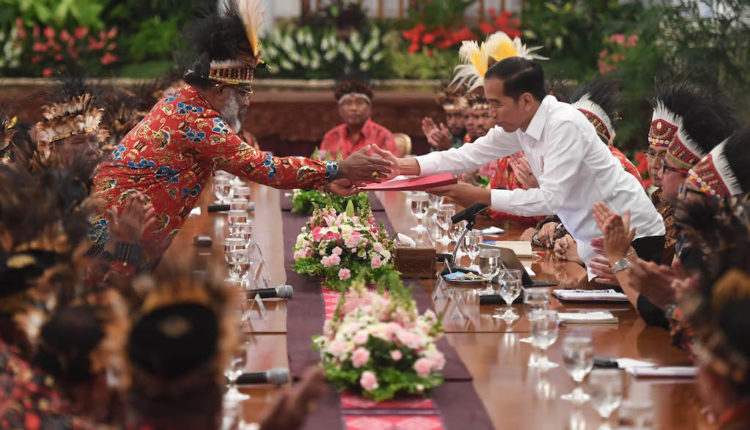The meeting between Papuan leaders and President Jokowi is a positive step
By: Abner Wanggai )*
After the hot situation in Papua and West Papua, 61 community leaders, traditional and religious leaders of Papua and West Papua on Tuesday (10/9) met with President Joko Widodo at the Jakarta Presidential Palace. The meeting was an attempt to reduce the riots, create a conducive situation, accommodate the aspirations of the people and concrete forms of efforts to advance Papua.
President Jokowi received aspirations from 61 Papuan leaders at the State Palace, Jakarta, Jakarta, Tuesday (09/10/2019). The invited figures are representatives from traditional, religious, tribal leaders, activists, and academics. The meeting was a concrete attempt by the Government to absorb the people’s aspirations and bring about peace after the riots in Papua.
There are a number of officials who accompanied President Jokowi. Some of these figures are Coordinating Minister for Political Law and Human Rights Wiranto, Head of the State Intelligence Agency Budi Gunawan, Minister of State Secretary Pratikno, and Minister of Foreign Affairs Retno LP Marsudi. Also attending was the President’s special staff for Papua Lenis Kogoya.
The presence of the ministers became a reflection of the seriousness that is always ready to overcome all problems in Papua
The event was opened by the Head of the National Intelligence Agency Budi Gunawan. In his remarks he hoped that through this meeting the leaders of Papua and West Papua could express their aspirations directly to Jokowi to advance and realize prosperity in the Land of Papua.
Furthermore, Head of BIN Budi Gunawan invited one of the Papuan leaders named Abisai Rolio to convey his aspirations. President Jokowi also looked serious listening to the aspirations of the Papuan figure.
Directly, Abisai Rolio asked Jokowi several things. Starting from asking for the expansion in 5 provinces in Papua and West Papua to build a presidential palace in Cenderawasih Earth. Then they also requested the placement of echelon 1 and echelon 2 officials in a number of ministries.
President Jokowi said that his party approved the effort to split Papua into 2-3 new areas, the construction of the archipelago dormitory, to the plan to establish the Papua Palace.
The meeting between President Jokowi and 61 Papuan leaders firmly showed that the Jokowi Government was serious in overcoming the Papua problem, especially after the riots. Therefore, it needs public support to solve problems and continue to carry out development in Papua.
This dialogue approach also needs to be carried out so that both parties can mutually understand the root causes. Nevertheless, Tirto.id considered that the meeting between President Jokowi and 61 Papuan Figures was a controversy.
Tirto.id’s oddity who doubted the meeting between President Jokowi and 61 Papuan leaders at the State Palace is doubtful. This is because the Coordinating Minister for Political, Legal and Security Affairs Wiranto has ensured that 61 Papuan and West Papuan leaders who met President Joko Widodo represented the local community. They are community and adat leaders.
“These figures, 61 figures, have been well filtered that they are really community leaders, traditional leaders,” Wiranto said during a press conference related to Papua, at the Office of the Coordinating Ministry for Politics and Security, Jakarta, Friday, September 13, 2019.
Wiranto also denied the statements of several parties accusing the 61 Papuan leaders of not representing Papuan figures and only for certain interests.
“I was also present there, and I am also sure there was not a single sentence that indicated that they asked for a position, asked for money. Nothing,” he said.
Wiranto said the meeting merely conveyed the aspirations of Papuan leaders to President Jokowi. Wiranto said Jokowi immediately responded to the aspirations of the people of Papua.
Building controversy by doubting the capabilities of the 61 Papuan leaders who met Jokowi is clearly counter-productive. When everyone began to believe in the handling of the Papua problem by the Government, the media actually showed the opposite step.
Media reports that cast doubt on the meeting of 61 Papuan leaders also have the potential to create new hatred and polemics. If this is done by individuals, it is understandable, but if this is done by journalists, it is appropriate to be questioned.
In building the controversy, it is clear that certain media are searching for loopholes to corner the Government, in pursuit of temple clicks. It is difficult to dismiss the notion that the effort is only as a way to be considered as a front-runner in disseminating information. In fact, these efforts actually only provoke new problems in the community.
Reflecting on the situation and condition of Papua which is gradually conducive, all parties including the press should also change their views. As part of professionalism, the press should be able to apply peaceful journalism as a unifying society, and not vice versa. This needs to be done considering President Jokowi’s meeting with the people of Papua is a real effort to make Papua more prosperous and at the same time accommodate the people’s aspirations so that the Papuan problem can be resolved soon.
)* The writer is a Papuan student living in Jakarta
